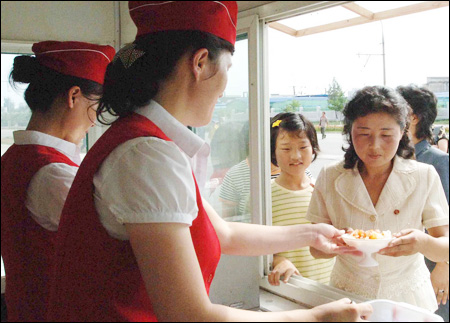
Rodong Sinmun stresses economy over politics

Economic coverage by a major North Korean newspaper has increased in recent months amid signals that the isolated state could experiment with reform, experts said Monday.
The Rodong Sinmun, the mouthpiece of the North’s ruling Workers’ Party, carried 506 economy-related articles during the first quarter of the year, up from 439 during the same period in 2011, according to Cho Bong-hyun, an analyst at the IBK Economic Research Institute.
By monthly count, the paper carried 233 stories on the economy in March alone, up from 132 in January and 141 in February, indicating an upward trend under the nascent leadership of Kim Jong-un, who took over in December after the death of his father Kim Jong-il.
The newspaper is known for its heavy coverage of the activities of North Korean leaders. Analysts said the shift could be the latest in a new governing style displayed by Kim, who was partly educated in Switzerland, and shows a more outward looking approach than that shown by his mercurial father.
“That indicates the North is setting its internal atmosphere as favorable to reform and is showing its willingness for change to the outside world,” Cho was quoted by Yonhap as saying.
Experts pointed to coverage of frequent visits by high ranking officials to industrial sites and a trip by the head of a joint venture investment committee to Singapore as examples of the paper signaling a new direction under Kim.
Speculation is rife over possible reform under the new leader, who has stressed quality of life issues since taking power. While his choice of site visits initially leaned heavily toward the military as he sought to consolidate its support, Kim has honed in on economic locations in recent months.
Last week, he replaced Ri Yong-ho, a career military man who helped him consolidate power, as military chief, putting his own man in the job, Vice Marshal Hyon Yong-chol. Pyongyang has been slowly trying to put the military under the control of the party, which analysts say could give bureaucrats more room to try out Chinese-style reforms.
The senior Kim led the country under a “military-first” policy that prioritized the army even during a massive famine during the 1990s. But he began stacking the party ranks as a safeguard from potential challengers as he prepared to hand power to his son.
The younger Kim has reportedly ordered cadres to seek solutions to economic problems since taking power. There have been signs indicative of change in the reclusive nation since the rise of the young leader.
He has been touting the need for the North to cope with the rapidly changing situation surrounding the nation, a departure from his late father in terms of leadership style.
He has been calling for efforts to catch up with the “world trend” in an apparent bid to help the Stalinist country overcome economic difficulties.
The regime is also referring to itself as a “nuclear state,” hinting that it feels more secure with its defenses and may move forward with reforms. <The Korea Times/Kim Young-jin>


